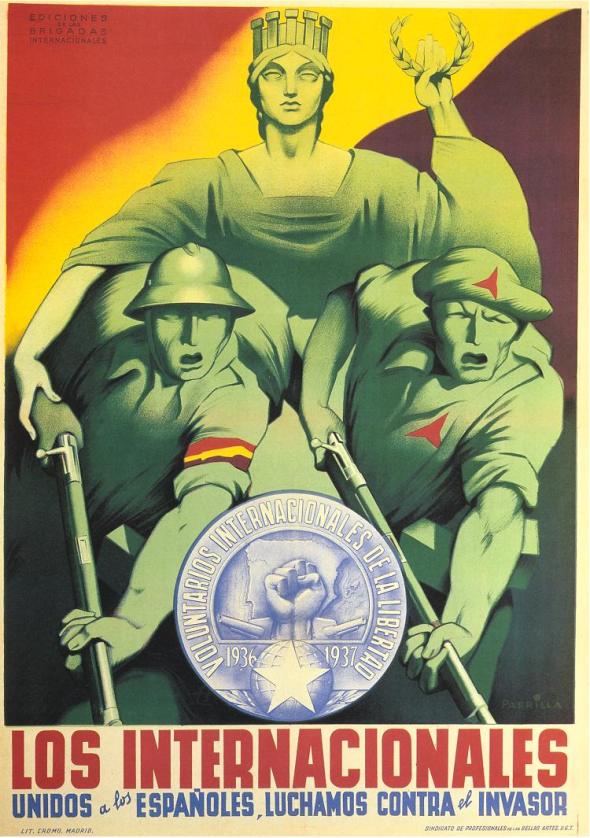In this post, David Bryan thinks about the uses of ‘internationalism’ in Wednesday’s House of Commons debate about United Nations Security Council Resolution 2249.
****
During his much-praised speech in the House of Commons on Wednesday night, Britain’s shadow foreign secretary Hilary Benn urged his colleagues to support the bombing of ISIS/Daesh in Syria by appealing to the Labour Party’s ‘internationalism’. Reaching back into the party’s history, he cited the examples of the British socialists who fought with the International Brigades during the Spanish Civil War and the struggle against Nazi Germany to argue that Labour MPs had a duty not to ‘walk by on the other side’ and to oppose the ‘fascism’ of ISIS.
Despite near-universal praise for its rhetorical power, Benn’s speech has drawn criticism both from those who reject the historical parallels between Syrian intervention and the fight against fascism, and those who feel that the bombing of Syria has no place within the internationalist traditions of the British left. Writing on the LRB blog, Michael Chessum rejected Benn’s appeal to socialist internationalism, arguing that he ‘colonised language that rightly belongs to his radical political rivals, and, in distorting it, made it meaningless.’
 Was Benn’s use of history and his appeal to the language of internationalism somehow meaningless or illegitimate? From an historian’s point of view, his attempts to draw parallels between the fight against ISIS and previous struggles against Franco and Hitler are obviously problematic. ISIS’s theocratic fundamentalism is clearly far-removed from the ideological traditions of twentieth-century fascism (although it is arguably just as problematic to ascribe the same label to the Assad regime, as Chessum attempts to do). Benn is not the first person to draw parallels between the Syrian conflict and the Spanish Civil War, and there are clear echoes of the Spanish conflict in the current mobilization of international volunteers, the international debate over intervention, and the refugee crisis. Despite this, the state-led bombing of Syria has little in common with the voluntary mobilization of the communists, socialists and trade unionists from around the world who fought in the International Brigades.
Was Benn’s use of history and his appeal to the language of internationalism somehow meaningless or illegitimate? From an historian’s point of view, his attempts to draw parallels between the fight against ISIS and previous struggles against Franco and Hitler are obviously problematic. ISIS’s theocratic fundamentalism is clearly far-removed from the ideological traditions of twentieth-century fascism (although it is arguably just as problematic to ascribe the same label to the Assad regime, as Chessum attempts to do). Benn is not the first person to draw parallels between the Syrian conflict and the Spanish Civil War, and there are clear echoes of the Spanish conflict in the current mobilization of international volunteers, the international debate over intervention, and the refugee crisis. Despite this, the state-led bombing of Syria has little in common with the voluntary mobilization of the communists, socialists and trade unionists from around the world who fought in the International Brigades.
Benn is not, of course, the first politician to make use of dubious historical parallels, and the oversimplification of history is a common feature of current debates about the crises in Europe and the Middle East. However, I would argue that he is on much firmer ground in his recourse to the language of internationalism. One of the aims of the Reluctant Internationalists project is to highlight the political, social and geographical diversity of the history of internationalism. As Chessum himself points out, internationalism is not confined to the liberal left, and over the last century has been evoked by states both large and small, by communists and fascists, by Catholics, Jews and atheists, by pacifists and militarists, and by big business and radical social movements.
Benn’s speech appealed specifically to the traditions of internationalism within the Labour Party and the British left. These traditions are, again, diverse ones, encompassing the international working class solidarity of the early socialist and trade union movement, the left-wing pacifism of the interwar period and the post-war anti-nuclear campaigns, and the anti-fascist activism which underpinned the International Brigades. Benn, however, was keen to stress another strand of this tradition, epitomised by Labour’s role in the foundation of the United Nations and its history of working together with other nations to ‘deal with threats to international peace and security.’ This muscular, multilateral, Bevinite tradition has arguably played a much more central role in the history of the Labour Party than the forms of pacifist internationalism which have only sporadically taken root there.
Whether or not we agree with Benn’s arguments over Syria and the historical parallels he used to justify them, its seems difficult to argue that his views or the language he used to express them are incompatible either with the history of internationalism in general, or with the internationalist traditions of the British Labour Party.
David Bryan is a member of the Reluctant Internationalists project at Birkbeck, and works on the history of modern Spain.
